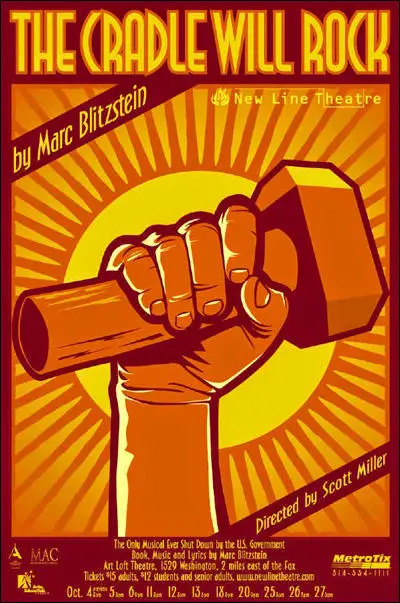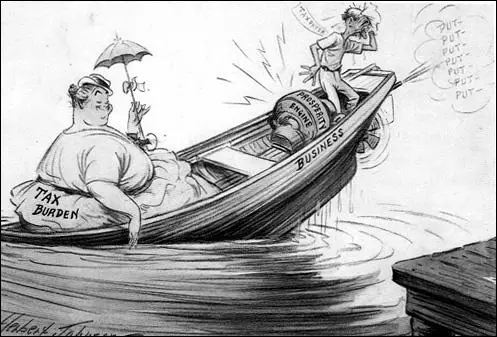Federal Theatre Project
The Works Projects Administration (WPA) was established by Franklin D. Roosevelt in 1935 as part of the New Deal attempt to combat the Depression. This included the Federal Theatre Project (FTP), an attempt to offer work to theatrical professionals. It was was established on 27th August, 1935. To direct the project, Harry Hopkins, named Hallie Flanagan, the head of Vassar's Experimental Theatre. Over a thousand theatre productions took place in twenty-two different states. Many of these were given free in schools and community centres. Other outstanding theatre people served as regional directors, including Charles Coburn and Hiram Motherwell. (1)
Although performers were only paid $22.73 a week, the FWP employed some of America's most talented artists. This included Arthur Miller, who was unemployed after graduating from the University of Michigan. He explained in his autobiography, Timebends - A Life (1987): "To join the WPA Theatre Project it was necessary to get on the welfare rolls first, in effect to be homeless and all but penniless... and conniving to get myself a twenty-three-dollar-a-week job." (2)
In 1934 Orson Welles directed Macbeth for the Negro People's Theatre, as part of the Federal Theatre Project. He also worked with John Houseman in the production of The Cradle Will Rock, a musical by Marc Blitzstein. Houseman argued that Blitzstein, described as "a play with music (while others, at various times, called it an opera, a labour opera, a social cartoon, a marching song and a propagandistic tour de force)". He wrote the play in only five weeks. (3)

The original production with Howard da Silva and Will Geer, was banned for political reasons. It eventually was performed at the Mercury Theatre (108 performances). Welles later recalled: "Marc Blitzstein was almost a saint. He was so totally and serenely convinced of the Eden which was waiting for us all the other side of the Revolution that there was no way of talking politics to him.... When he came into the room the lights got brighter. He was a an engine, a rocket, directed in one direction which was his opera - which he almost believed had only to be performed to start the Revolution." (4)
Elmer Rice was placed in charge of the Federal Theatre Project in New York City. In 1936 alone, the FTP employed 5,385 people in the city. Over a three year period over 12 million people attended performances in the city. One of Rice's innovations was the Living Newspaper (plays which were essentially theatrical documentaries). The first of these plays, Ethiopia, which dealt with Italy's invasion of the country, was banned by Harry Hopkins. (5)

Herbert Johnson, Saturday Evening Post (1935)
One play, It Can't Happen Here, by Sinclair Lewis, in 1936, was produced simultaneously in 22 cities. The Lost Colony (1937) by Paul Green, was an outdoor historical pageant that was performed in a Works Projects Administration built theatre on Roanoake Island. However, several plays were censored as it was believed they were too political. Harold Clurman defended the Federal Theatre Project because he believed it was "the most truly experimental effort ever undertaken in the American theatre." (6)
J. Parnell Thomas, a member of the Un-American Activities Committee (HUAC), described the Federal Theatre Project as being "infested by radicals from top to bottom" and on 26th July, 1938, called for Hallie Flanagan to answer questions before the committee. Flanagan immediately went on the attack arguing that: "Some of the statements reported to have been made by him (Parnell Thomas) are obviously absurd... of course no one need first join or be a member of any organization in order to obtain employment in a theatre project." She also pointed out that only ten per cent of the plays presented by the Federal Theatre dealt with social and political problems. (7)
Sallie Saunders, appeared before the HUAC and condemned the Federal Theatre because it had performed "pro-union plays, plays referring to Negro discrimination, and anti-Fascist plays." Saunders also complained that the project encouraged racial integration and that while working for the FTP she had been "telephoned by a Negro for a date". Hazel Huffman, a former employee of the Works Projects Administration (WPA), claimed that Hallie Flanagan was a person who "was known as far back as 1927 for her communistic sympathy, if not membership" and pointed out that 147 pages of her book, Shifting Scenes of the European Theatre, was devoted to "eulogizing the Russian theater." (8)
Hallie Flanagan eventually appeared before the HUAC. She later recalled: "The room itself, a high-walled chamber with great chandeliers, was lined with exhibits of material from the Federal Theatre and the Writers' Project; but all I could see for a moment were the faces of thousands of Federal Theatre people; clowns in the circus ... telephone girls at the switchboards... actors in grubby rehearsal rooms... acrobats limbering up their routines... costume women busy making cheap stuff look expensive... musicians composing scores to bring out the best in our often oddly assembled orchestras... playwrights working on scripts with the skills of our actors in mind... carpenters, prop men, ushers. These were the people on trial that morning. I was sworn in as a witness by Chairman Dies, a rangy Texan with a cowboy drawl and a big black cigar. I wanted to talk about Federal Theatre, but the Committee apparently did not... Here was a Committee which for months had been actually trying a case against Federal Theatre, trying it behind closed doors, and giving one side only to the press. Out of a project employing thousands of people from coast to coast, the Committee had chosen arbitrarily to hear ten witnesses, all from New York City, and had refused arbitrarily to hear literally hundreds of others, on and off the project, who had asked to testify." (9)
J. Parnell Thomas objected to the radical message in some of these plays. Thomas claimed that: "Practically every play presented under the auspices of the Project is sheer propaganda for Communism or the New Deal." Martin Dies, the chairman of the Un-American Activities Committee, called for the resignations of Harold Ickes, Harry Hopkins and Frances Perkins, as the three had "associates who were Socialists, Communists, and crackpots." (10)
Franklin D. Roosevelt refused to sack these three members of his government but Congress bring the Federal Theatre Project to an end and allowed the other projects to continue only if they found local sponsors who would bear 25 per cent of the cost. During its four years existence the FTP launched or established the careers of such artists as Orson Welles, John Houseman, Will Geer, Arthur Miller, Paul Green, Marc Blitzstein, Canada Lee and Elmer Rice. (11)
Elmer Rice later wrote: "Nationally, the Theatre Project's record was extraordinary. At one time forty-two separate units were in operation in twenty states, with a total of nearly thirteen thousand employees... In its first three years the Theatre Project had produced more than nine hundred different plays, for a total of nearly 55,000 performances, many of them free, none charging more than a dollar. The attendances figures exceeded 26,000,000... In the project's fourth year, Congress killed it... Its demise was perhaps the most tragic occurrence in the cultural history of the United States. Had funds been provided for continuance, upon an artistic basis divorced from unemployment relief, of those units that had clearly demonstrated their worth, the foundation would have been laid for a nationwide theatrical structure that would have brought enlightenment and enjoyment to millions, and stimulation to artistic creation. The cost, compared to the billions expended annually upon weapons of destruction, would have been infinitesimal." (12)
Primary Sources
(1) Arthur Miller, Timebends - A Life (1987)
To join the WPA Theatre Project it was necessary to get on the welfare rolls first, in effect to be homeless and all but penniless... My purity was still breathtakingly unmarred through the thirties, so much so that at a certain point in 1939, only months out of college and conniving to get myself a twenty-three -dollar-a-week job on the Federal Theatre Project, which was already coming to its end, I had no qualms about turning down a two-hundred-and-fifty-dollar-a-week offer by a Colonel Joy, representing Twentieth Century Fox, to come to work for them.
(2) Hallie Flanagan, Arena the History of the Federal Theatre (1965)
Before me stretched two long tables in the form of a huge T. At the foot was the witness chair, at the head the members of the Committee. At long tables on either side of the T were reporters, stenographers, cameramen. The room itself, a high-walled chamber with great chandeliers, was lined with exhibits of material from the Federal Theatre and the Writers' Project; but all I could see for a moment were the faces of thousands of Federal Theatre people; clowns in the circus ... telephone girls at the switchboards... actors in grubby rehearsal rooms...acrobats limbering up their routines... costume women busy making cheap stuff look expensive... musicians composing scores to bring out the best in our often oddly assembled orchestras... playwrights working on scripts with the skills of our actors in mind... carpenters, prop men, ushers. These were the people on trial that morning. I was sworn in as a witness by Chairman Dies, a rangy Texan with a cowboy drawl and a big black cigar. I wanted to talk about Federal Theatre, but the Committee apparently did not...
As the hearing broke up I thought suddenly of how much it all looked like a badly staged courtroom scene; it wasn't imposing enough for a congressional hearing on which the future of several thousand human beings depended. For any case on which the life and reputation of a single human being depended, even that of an accused murderer, we had an American system which demanded a judge trained in law, a defense lawyer, a carefully chosen jury, and above all the necessity of hearing all the evidence on both sides of the case. Yet here was a Committee which for months had been actually trying a case against Federal Theatre, trying it behind closed doors, and giving one side only to the press. Out of a project employing thousands of people from coast to coast, the Committee had chosen arbitrarily to hear ten witnesses, all from New York City, and had refused arbitrarily to hear literally hundreds of others, on and off the project, who had asked to testify...
Congressman Thomas was jovial. "You don't look like a Communist," he declared. "You look like a Republican!"
"If your Committee isn't convinced that neither I nor the Federal Theatre Project is communistic I want to come back this afternoon," I told him.
"We don't want you back," he laughed. "You're a tough witness and we're all worn out."
(3) Martin Dies, The Trojan Horse in America (1940)
Works Projects Administration (WPA) was the greatest financial boon which ever came to the Communists in the United States. Stalin could not have done better by his American friends and agents. Relief projects swarmed with Communists - Communists who were not only recipients of needed relief but who were entrusted by New Deal officials with high administrative positions in the projects. In one Federal Writers' Project in New York, one third of the writers were members of the Communist Party. This was proven by their own signatures. Many witnesses have testified that it was necessary for W.P.A. workers to join the Workers Alliance - high-pressure lobby run by the Communist Party - in order to get or retain their jobs.... Several hundred Communists held advisory or administrative positions in the W.P.A. projects.
Student Activities
Economic Prosperity in the United States: 1919-1929 (Answer Commentary)
Women in the United States in the 1920s (Answer Commentary)
Volstead Act and Prohibition (Answer Commentary)
The Ku Klux Klan (Answer Commentary)
Classroom Activities by Subject
